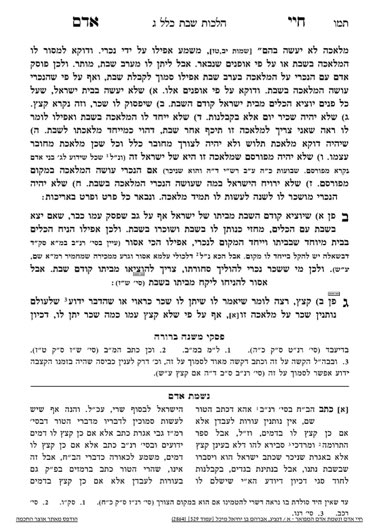We are beginning siman 2, where the Chayei Adam will discuss the first criterion for it to be permitted to make an arrangement with a non-Jew before Shabbos regarding something on Shabbos. We learned that the first criterion is that the item be removed from the Jew’s home before Shabbos.
The Chayei Adam writes that even if the arrangement was made with the non-Jew before Shabbos, and there will be no interface with the non-Jew when he comes to remove the items on Shabbos, it is still assur for the non-Jew to work. The Chayei Adam explains that if a bystanding Jew sees this non-Jew leave the Jew’s home on Shabbos with items, the bystanding Jew will think the arrangement was made on Shabbos itself, which is assur. These potential bystanders create a concern for maris ayin, and it is assur.
The Chayei Adam adds that even if one sets aside a special room for the non-Jew, and even gifted it to him such that the Jew no longer owns the room, it is still assur for the non-Jew to pick up the items on Shabbos. Since it will still be taken out of the property of the Jew, the bystander will not know that the non-Jew is removing the item from his private area but will think the non-Jew is working for the Jew on Shabbos.
The Chayei Adam writes that even if one lends items to a non-Jew, the non-Jew must remove the items before Shabbos as well, due to the same concern of maris ayin. However, in a scenario where the Jew sets aside a specific place for the non-Jew’s items, it is muttar for the non-Jew to come in and remove his items on Shabbos. In this scenario, the fact that the non-Jew is not working for the Jew at all, plus the private area set aside, are sufficient to allow the non-Jew’s presence.
Nevertheless, over here, regarding a non-Jew working for the Jew, it is assur. The Chayei Adam points out that this leniency only applies by lending. We see elsewhere that when a Jew sells items to a non-Jew and gifts him a private area for the items, the non-Jew cannot pick them up on Shabbos. Thus, in our case, where the Jew receives benefit from the non-Jew’s work, it is certainly assur, even with setting aside a private area.
The Chayei Adam continues, and writes that if a Jew has merchandise which he wants transported to another city, he can hire a non-Jew to transport the merchandise. The non-Jew can travel on Shabbos, because he is hired as a kablan, so he is hired per job and therefore considered working on his own accord. Nevertheless, the non-Jew cannot retrieve the items from the Jew’s house on Shabbos, and the Jew must prevent him from removing them on Shabbos should the non-Jew wish to do so.
Summary
- If one instructs a non-Jew before Shabbos, there are times when it will be muttar, depending on eight conditions.
- The first condition is that the work cannot be done in the home of any Jew, and any materials must be removed from the home of the Jew before Shabbos. This condition is out of concern for maris ayin.
- It does not help for the Jew to gift the non-Jew a place for these items.
- If the non-Jew nevertheless appears and wishes to retrieve the items, the Jew must stop him.



